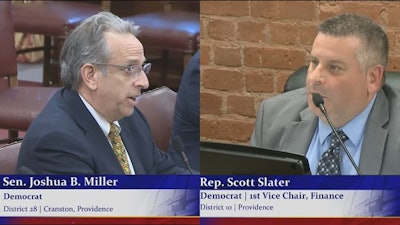
Rhode Island is on the verge of becoming the 19th state to legalize adult-use cannabis as legislation is expected to receive floor consideration in each chamber of the state’s bicameral Legislature next week.
The momentum on reform comes after state Sen. Joshua Miller and Rep. Scott A. Slater—both Democrats—added a key amendment to their companion bills May 17.
RELTED: Rhode Island Senate, House Lawmakers Align on Cannabis Legalization; Votes Expected
The next day, Senate Judiciary Committee members voted, 9-1, to advance Senate Bill 2430 Substitute A, sponsored by Miller, and House Finance Committee members voted, 12-2, to pass House Bill 7593 Substitute A, sponsored by Slater. The identical bills—the Rhode Island Cannabis Act—now head to their respective chambers with full-body votes expected May 24.
Before the Senate Judiciary Committee vote on May 18, Miller stressed the significance of having both chambers on the same page.
“We are fortunate to not only to have such great staff but be in the position to have identical bills,” he said. “I’ve been doing this for several years, as all of you know, and this is the first year in which we’ve had collaborative and identical bills before both the House and the Senate.”
Slater told House Finance Committee members Wednesday that he’s been working toward adult-use cannabis legalization for 10 years now.
One addition made in the substitute versions that was added May 17 includes the automatic expungement for those with previous cannabis convictions.
Specifically, those with any prior civil violation, misdemeanor or felony conviction for possession of cannabis that would be decriminalized by the bill would receive expungement free of charge and without a hearing by July 1, 2024. And people who wish to receive expungement of their records earlier can petition the court to do so under the bill.
Sen. Ana B. Quezada, a member of the Judiciary Committee who also serves as the Deputy Senate Majority Whip, said Wednesday that the expungement revision was paramount to her support.
“One of the things I like about this bill is the part where so many people of color paid a very high price in the 80s, in the 90s, about selling marijuana, and they be in jail,” she said. “Now, at least they’re going to have expungement for those records. And that’s one of the things you asked me six years ago when I became a senator … you asked me if I supported marijuana. I said, ‘No.’ But seeing what I see today in our community, I think it’s the right thing to do.”
Remaining intact from the original version of the bill introduced March 1, the legislation aims to legalize the purchase and possession of up to 1 ounce of cannabis by adults 21 and older, who could possess up to 10 ounces in their personal residences and grow up to six plants (three mature) in their homes, according to the bill’s text.
In addition, the legislation’s proposed tax structure includes a 10% cannabis excise tax and a local 3% tax for municipalities where sales take place, in addition to the state’s current 7% sales tax.
Democratic Sen. Leonidas Raptakis cast the lone dissenting vote in the Judiciary Committee on Wednesday. He expressed concerns over impaired driving.
Meanwhile, in the House Finance Committee, Slater had the opportunity to speak and to vote on his sponsored bill as the first vice chair of that committee.
“The goal of the original bill we heard back in March was to legalize consumption and sale of cannabis for adults in a safe and orderly way,” he said. “As you know, it’s also been a big priority for me to protect the medical cannabis program and to address the concerns of social equity within the cannabis program.”
Retained in the March 1 version of the legislation, the Rhode Island Cannabis Act aims to reduce participation barriers for communities and individuals disproportionately affected by prohibition, including the use of licensing fees and penalties to fund assistance and grants for qualifying applicants.
In addition to the state’s nine licensed compassionate care centers, the legislation would allow for 24 new adult-use retail licenses, which would be distributed equally among six geographic zones. One retail license in each zone would be reserved for a social equity applicant and another in each zone for a cooperative applicant.
While the legislation provides for local control for city or town officials to adopt ordinances or bylaws that impose reasonable safeguards on the operations of cannabis establishments, or the ability to opt out from participating in the state’s program altogether, existing medical operators would be grandfathered in and allowed to continue their current operations.
The legislation also paves way for any forthcoming licensed adult-use retailers to launch commercial sales on Dec. 1, 2022.
With both the Senate Judiciary and House Finance committees moving the companion bills to their respective floors for full-chamber discussions May 24, Rhode Island is poised to join the likes of Massachusetts, Connecticut, Maine and Vermont in legalizing adult-use cannabis. New Hampshire is the only other New England state that has yet to do so.


























